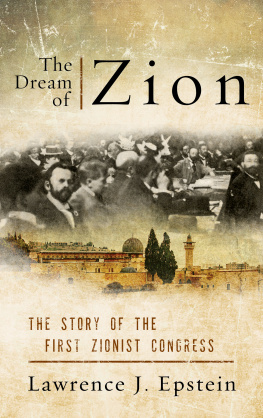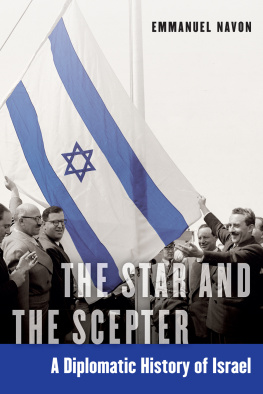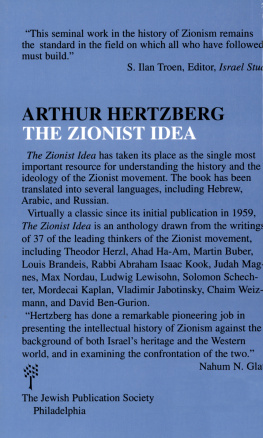This edition is published by Valmy Publishing www.pp-publishing.com
To join our mailing list for new titles or for issues with our books valmypublishing@gmail.com
Or on Facebook
Text originally published in 1959 under the same title.
Valmy Publishing 2017, all rights reserved. No part of this publication may be reproduced, stored in a retrieval system or transmitted by any means, electrical, mechanical or otherwise without the written permission of the copyright holder.
Publishers Note
Although in most cases we have retained the Authors original spelling and grammar to authentically reproduce the work of the Author and the original intent of such material, some additional notes and clarifications have been added for the modern readers benefit.
We have also made every effort to include all maps and illustrations of the original edition the limitations of formatting do not allow of including larger maps, we will upload as many of these maps as possible.
PRELUDE TO ISRAEL
AN ANALYSIS OF ZIONIST DIPLOMACY, 1897-1947
by
ALAN R. TAYLOR
PREFACE
The object of this book is to analyze the nature of Zionism and to give a candid picture of the movement in operation, concentrating on the diplomatic activities of its leadership. It is to show the origin of a political movement, the formulation of its aim, and the implementation of policies designed to fulfill that aim. It is to examine the modern political phenomenon of Zionism in historical perspective and to demonstrate its unity of purpose and consistency of action. It is to throw light on the whole story of Zionist political activity, for it is a duty of the historian to bring clarity and completeness of narrative to his subject. His mission is to render a true picture of that subject, interpreting to show the relation between facts, but not to pass moral judgment. Today, the story of Zionist diplomacy is obscure, but the inevitable course of historical investigation will some day make it otherwise. It is to that task that this book is dedicated.
This book also has a secondary purpose. It seeks not only to engender a clearer concept of the nature and history of Zionism, but also to dispel certain misconceptions about the movement. For example, Zionism is frequently regarded as a religious movement. In actual fact, however, it is fundamentally secular, and its leaders have regarded it as such. Zionism is an answer to the secular problem of anti-Semitism. Its basic premise is that the only solution to this problem is the creation of a Jewish state and the attribution of national status to Jewish character. In a deeper sense, it is the reaction of East European Jewry to ghetto life in Russia, Poland and Germany. It was here that the movement started, not in the West, where great strides in the assimilation of Jews have been made. In time, however, the movement spread, for the founders realized that they could not justify their premise without the support of world Jewry. In their search for the support of all Jews, the Zionists employed the romantic idea of the return, a concept which holds emotional appeal for all Jews. It was thus that Zionism became mistakenly confused with Judaism, but this did not alter the essentially secular character of the Zionist movement.
A second misconception which this book seeks to set right concerns the manner in which Israel came to be. Many believe that the establishment of the state was an entirely spontaneous affair, arising out of the traditional longing of Jews to return to Palestine. Historical examination, however, reveals that the creation of Israel is the result of Zionist planning and organized effort. In the early years of this century, only a handful of world Jewry took any active interest in the Zionist idea, and it was not until the Second World War that even a majority of Jews became sympathetic with Zionism. It was Zionist activity which not only drew Jews into the movement, but also prepared the way for Jewish statehood through concrete action. It would not be fair to the past leaders of Zionism to deny their rightful claim to having made Israel with their own hands.
Throughout the book, reference is made to activities which were planned and carried out by the leaders of Zionism. It should be pointed out here that it is at times impossible to prove that such planning and direction took place by reference to minutes of top level Zionist meetings or documents published by Zionist leaders. However, it may be assumed that planning and direction existed, when all evidence points to co-ordinated action and the existence of policy direction. Similarly, it is not paradoxical that Zionism has remained unified and directed, though the movement has always been divided into factions. There is divergence of opinion within Zionism, but there also has always been a leadership which directs the movement toward the fulfillment of the aims which were clearly and firmly established at its inception.
One further remark concerning the nature of Zionism should be made to avoid confusion in the readers mind. In the early years of the movement, there were two types of adherents: those seeking cultural as opposed to those seeking political fulfillment. The cultural Zionists were interested primarily in the rebirth of Hebraic culture, in the linguistic, religious, and ethnic connection of the Jews to historic Palestine. The political Zionists, on the other hand, were concerned with the Jewish problem, and to them, Palestine was the most logical place for the establishment of a Jewish national state. Some of the early political Zionists did not even insist on Palestine, a fact which demonstrates their far greater concern with the creation of Jewish nationality than with Jewish culture and the romantic notion of the return. When Zionism was organized in the late nineteenth century, the political adherents gained control of the movement, and thus when the term Zionism is not further qualified in this book, it will refer to what should more accurately be called political Zionism.
The author gratefully acknowledges the assistance of his sister-in-law, Phyllis Hoffman Taylor, who not only typed the manuscript, but also made many helpful editorial suggestions. The author also acknowledges the careful guidance and stylistic suggestions of Mr. Richard Norman Tetlie, founder of the United States Information Service in Israel. Mr. Tetlies unremitting objectivity and intimate knowledge of the subject matter made him an invaluable mentor and a real contributor to the publication of this book. The assistance of Professor George E. Kirk of Harvard University, who made many corrections and suggestions, is gratefully acknowledged. The interpretation, however, is entirely that of the author. The portraits of leading Zionists were supplied by courtesy of Zionist Archives and Library of the Palestine Foundation Fund. Finally, the author expresses his appreciation for the painstaking efforts of his wife, Lydia Schurman Taylor, whose contribution to the preparation of the manuscript was above and beyond the call of duty.
A. R. T.
Washington, D. C.
CHAPTER I THE CREATION OF ZIONIST AIMS AND POLICY
The Beginnings of Political Zionism
The idea of Zionism has existed for centuries as a facet of Jewish and Christian thought. {1} In the former, it has been the result of an association of Judaism with the ancient kingdom of the Hebrews in Palestine. In the latter, it has existed since the Cromwellian period, when it was supposed that the coming of the Millennium, or the thousand year reign of Christ on earth, would be accompanied by a restoration of the Jews to Palestine.











